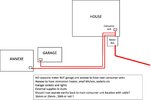- Joined
- 26 Mar 2020
- Messages
- 31
- Reaction score
- 1
- Country

HI
what size & type of cable is required if putting sub mains to an annexe & a garage .
The main house is on external meter box
Garage & annexe to have their own supply and consumer unit fed back from just before the house internal consumer unit
(so all metered from main meter)
Not sure what size of cable and does it need too be armoured ? there will be ducts used.
I could run separate earths back to house as well (someone suggested)
From a 1st fix / groundwork perspective , accepting this is subject to a proper calculation what would be needed as a rule of thumb ??
16mm 25mm SWA ??
what size & type of cable is required if putting sub mains to an annexe & a garage .
The main house is on external meter box
Garage & annexe to have their own supply and consumer unit fed back from just before the house internal consumer unit
(so all metered from main meter)
Not sure what size of cable and does it need too be armoured ? there will be ducts used.
I could run separate earths back to house as well (someone suggested)
From a 1st fix / groundwork perspective , accepting this is subject to a proper calculation what would be needed as a rule of thumb ??
16mm 25mm SWA ??


